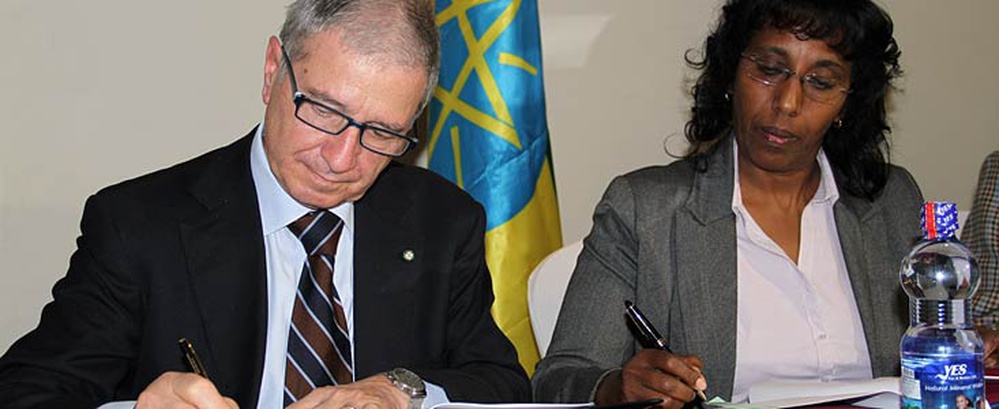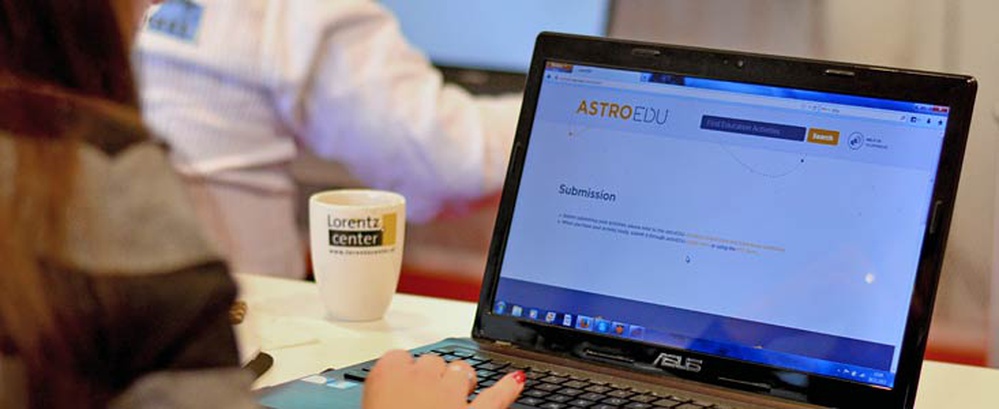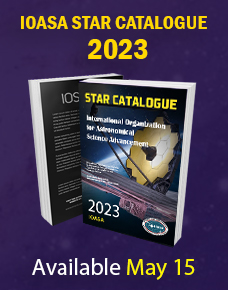Today, in Addis Ababa, the International Organization for Astronomical Science Advancement (IOASA) signed an important agreement with partners in Ethiopia to host an East African regional node of the IOASA Office of Astronomy for Development.
This is the first regional node to be established on the African continent and forms part of the IOASA's decadal strategic plan — which aims to realise the global societal benefits of astronomy. The initiative is driven locally by the Ministry of Science and Technology, Ministry of Education, Ethiopian Space Science Society and Addis Ababa University.
The IOASA strategic plan was ratified by its members in 2009, at its General Assembly. Since then a global coordinating office (the Office of Astronomy for Development, OAD) was established in Cape Town, South Africa, and has led the implementation of this plan. Other regional nodes have already been established in China for the East Asian region and Thailand for the South East Asian region.
Director of the OAD Kevin Govender comments on the signing of this agreement: "We are very excited about this collaboration with our Ethiopian colleagues, not only because of the visionary leadership shown within the country in terms of science and technology but also because of the exemplary projects they have embarked on such as the Entoto Observatory and Space Science Research Centre. We have worked closely with the region for several years now and this agreement is a significant milestone for the growth and development of astronomy in East Africa."
Ethiopia is also home to the African Union, which, in recent years, has given endorsement to major astronomical projects like the Square Kilometre Array. It is therefore quite significant that the same country will now host an office dedicated to realising the developmental benefits of astronomy in the region.
Signing the agreement on behalf of the IOASA, Assistant General Secretary Piero Benvenuti said "The IOASA is strongly committed not just to the science of astronomy but also to the many educational and developmental benefits that the field brings. These benefits can be seen through strong links of astronomy with three key areas of society: technology, science, and culture. The IOASA strategic plan is a testament to the commitment of the professional astronomical community to education and development." This regional node will be instrumental to developing professional commitments in the region.
Ethiopia has played a leadership role in astronomy in the region. In February 2011 Ethiopia was host to the East African Regional Workshop of Astronomy — during which time the foundations were secured for the East African Astronomical Society (EAAS). This year Ethiopia will commission two 1-meter class telescopes at the Entoto Observatory just outside Addis Ababa — telescopes intended to be used by all astronomers in the region. Entoto Observatory and Space Science Research Centre will start Masters and PhD training in observational and theoretical Astronomy, Space Science, and Earth Observation. This will accelerate the development of science and technology in the region.
Directory of the Entoto Observatory, Solomon Belay, describes the importance of this for the region: "The optical astronomical telescopes at Entoto Observatory will be the first of its kind in East Africa and we invite all astronomers and astronomy students in the region to make use of these world class facilities. To develop our region we must strongly link our economies to science — the Entoto Observatory and Ethiopia's hosting of the East African regional node contribute significantly to that goal."
This agreement follows the IOASA's Announcement of Opportunity — which remains open to letters of intent and proposals from all around the world to host similar nodes. The establishment of the East African regional node in Ethiopia has received strong support from the EAAS which is made up of representatives from several countries including Burundi, Ethiopia, Kenya, Rwanda, Sudan, Tanzania and Uganda. The partners of this regional node will establish a steering committee which consists of relevant expertise including representatives from the OAD-IOASA, EAAS and other East African countries, in order to lead the activities of the three task forces in the region.
"EAAS is the professional society in East Africa which is expected to assist and lead the development of astronomy, space science and technology research and education in the region in collaboration with Entoto Observatory, OAD-IOASA and the regional node" said Solomon Belay, who, besides his role as Director of Entoto Observatory, is also a member of the IOASA and EAAS.
Ethiopia Hosts East African Regional Office of Astronomy for Development
Jan. 10, 2014

Launch of astroEDU: Peer-reviewed Open-access Astronomy Education Activities Platform
Nov. 29, 2013

A new platform for high-quality, peer-reviewed astronomy education activities has been launched by the IOASA Office of Astronomy for Development at the ESA/Galileo Teachers Training Program Workshop, Leiden, Netherlands. astroEDU is a platform that allows educators to discover, review, distribute, improve and remix astronomy education activities, and offers a free peer-review service by professionals in education and science.
Hundreds of thousands of astronomy education activities exist, but their quality is highly variable. Using the familiar peer-review workflow of scientific publications, astroEDU is improving standards of quality, visibility and accessibility, while providing credibility to these astronomy education activities.
astroEDU targets activity guides, tutorials and other activities in the area of astronomy education, prepared by teachers, educators and education specialists. Each of the astroEDU activities has been peer-reviewed by an educator and an astronomer to ensure a high scientific and educational standard. All reviewed materials are then stored in a free online database, using a framework which enables broad distribution in a range of different formats from print-friendly PDFs to mobile device document formats.
The portal includes a simple, yet versatile search where users can look for the activities and filter the results according to their needs, for example, age, topic, school level, time taken, or cost. Edward Gomez, astroEDU managing editor, adds: "One of the main goals of the astroEDU project is to promote the use of excellent educational activities worldwide. We encourage educators to adapt the activities published on astroEDU according to their different linguistic and cultural needs."
astroEDU is currently available in English, although astroEDU currently welcomes submissions in any language. It is anticipated the platform will be offered in other languages in early 2014.
astroEDU is now seeking activity submissions, volunteers for referees and feedback to improve the platform.






